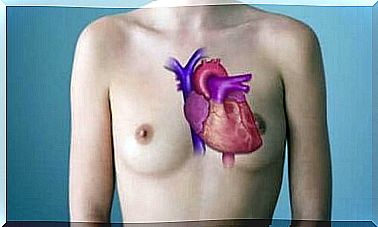Hyperphagia: Excessive Appetite

The word hyperphagia comes from the Greek, where hyper – means “excess” and – fagia means “to eat”. It is a disorder in which the urge to eat is much stronger than usual. Furthermore, food intake is also not controlled.
The feeling of hunger is the normal urge to eat when the body feels the need. However, in people who suffer from hyperphagia, this urge is uncontrollable. Those who suffer from it eat huge amounts of food at once.
This pathology is often accompanied by other health complications. Therefore, in this article, we explain what hyperphagia consists of and what its main causes are.
What is hyperphagia?
As we have already explained, the feeling of hunger is a physiological desire that makes us eat when we feel the need. However, in hyperphagia this desire increases dramatically. Food intake becomes uncontrollable.
A person with hyperphagia eats large amounts of food in one meal. Furthermore, they are generally unhealthy or nutritious foods.

What are the symptoms?
The main problem is that there is a compulsive urge to eat. This need appears at any time, even at night. This causes the person to eat continuously, even if they have just had lunch or dinner.
Meals are usually eaten quickly and with little chewing. Also, there is a predilection for fatty or sugary foods. In addition to this continued appetite, hyperphagia is accompanied by other symptoms.
People with hyperphagia are often ashamed of being unable to control themselves. They also feel an enormous sense of guilt. Their behavior is generally not associated with vomiting or laxatives: this is the main difference with bulimia.
Depending on the cause, this increased appetite can lead to overweight and obesity. This causes self-esteem to deteriorate further and insecurity to drastically increase. Therefore, depression can also be considered a symptom derived from this pathology.
This obesity also brings as a consequence other serious diseases, such as hypertension and diabetes. Hyperphagia is related to increased cholesterol and triglycerides, which, as we know, are harmful to our cardiovascular health.
Also, eating so fast and in large quantities can cause digestive problems. Digestion is heavier, some nutrients are not absorbed properly and the risk of dehydration increases.

What are the causes of hyperphagia?
In most cases, hyperphagia is caused by a psychological disorder. The main causes are low self-esteem, fear or inability to relate correctly to other people. Hyperphagia is usually a consequence of the anxiety that these situations provoke.
In fact, it could also be related to a specific problem. For example, it may appear in some women during premenstrual syndrome. Also in people with a disease of the thyroid gland or in diabetics. Other causes are:
- Bulimia.
- Gestational diabetes.
- Certain medications such as antidepressants.
- Hypoglycemia.
The point is that all these situations cause leptin levels to change. Leptin is the hormone responsible for the sensation of appetite. The result is that hunger and satiety are not differentiated in these patients.
What to do in case of hyperphagia?
The main measure is to go to the doctor to study the possible causes that may be triggering hyperphagia. If it is a consequence of a drug, a new dose will certainly be prescribed or the treatment will be replaced.
When the problem is caused by anxiety or depression, the ideal is to start an adequate psychological treatment, although the possible metabolic causes should be ruled out first. For this, different complementary exams are performed.
First, blood and urine tests are performed. Thyroid gland function should also be evaluated to rule out a possible pathology such as hyperthyroidism.
Conclusion
Hyperphagia is a condition that can have many causes, from a problem in the thyroid gland to a psychological disorder. Also, it is not just a problem of being overweight, but it can end up leading to different illnesses like diabetes or high blood pressure.
For this reason, it is essential to go to the doctor so that he can perform the relevant tests. Finding the cause and establishing an appropriate treatment is essential to prevent the problem from becoming more serious.









